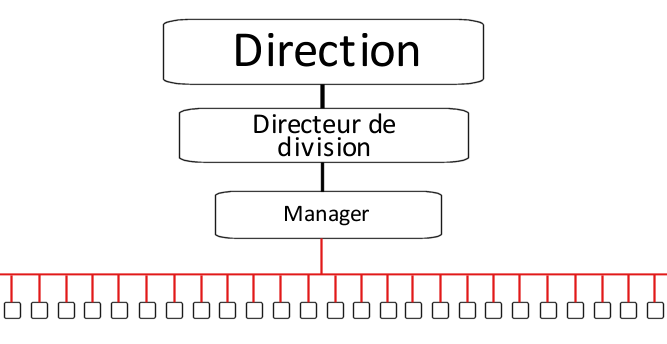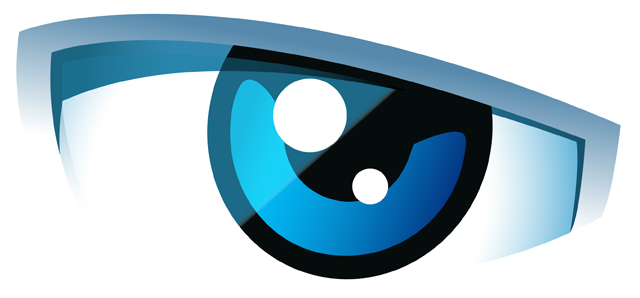We are experiencing a period of transition in the world of work, marked by the advent of web 2.0 and collaborative information systems. Consequently, the avenues mentioned below can be useful to you whether for recruiting or being recruited, but also for managing your career, entrepreneurship, imagining new solutions for your colleagues or simply understanding the world around you.
Note: This chapter initially published on February 2, 2012 and republished in 2023 is the 1st in a series of course on Management 2.0, the summary of which can be found here.
1. Salaried employment tends towards collaboration
Formerly marked by obedience and the vertical hierarchy, management tends to move towards a form of transversal collaboration where the desired value is the added value, skill, talent and expertise, preferentially over presenteeism. We are moving towards the obligation of results, to the detriment of the obligation of means.
From then on, the employee is encouraged to take initiatives, manage their tasks, demonstrate autonomy and take responsibility.
This type of management is therefore not very suitable for profiles who need to have a structured path to follow: creativity, imagination and autonomy are now increasingly sought-after values. This is demonstrated by web-based companies, which favor an extremely specific organization, marked by a very short hierarchy and an extraordinary number of subordinates per manager.

The two major advantages of this type of organization are the following:
– Innovation can come from anywhere. The hierarchy should not block creativity, but rather process all the ideas that come back to it.
– Clusters and working groups make it possible to create a collective and shared intelligence (which brings us to the cloud and synchronization of stored data).
2. Tools for personal use that inspire the professional world
In the past, professional tools made available in the world of work were subsequently reinvented for personal uses, such as the computer or messaging for example. Today, the trend has been profoundly reversed: social networks focused on entertainment have, for example, inspired business social networks. Personal Twitter accounts and Facebook profiles have pushed companies to create professional profiles for external communication.
In short, many concepts initially aimed at consumers are taken up by companies for internal or communication use. So stay alert!
3. Organization, storage and recruitment are dematerialized
The example of recruitment by Skype, mentioned by the founder of the startup Work4labs at the conference, shows the way to the largest companies. Globalization, geographic distance and the use of the Internet and information systems are leading international companies to better connect their employees, wherever they are on the planet.
I also think of schools which will now teach by video, and which I hope will make it possible to provide knowledge at lower costs, particularly for those whose access to it is difficult.
4. More and more grafted concepts
The web has allowed many businesses to start with an already existing concept and build on it. In the same way that a shopping street generates activity because complementary businesses or even competitors are all located there next to each other, the Internet makes it possible to create centers from complementary concepts to each other.
Recruitment through Facebook, or even online games on Facebook or partnerships with Spotify, but also the exploitation of CMS such as WordPress or Prestashop for commercial purposes (via the sale of add-ons, themes, advice or simply through their use), are examples among others of these so-called grafted concepts.
In other words, creativity calls for creativity, and there are at least as many concepts to create as there are already existing concepts, from which we can exist and develop.
5. The world of work tends to be more flexible and more uncertain

The counterpart of the first point mentioned and which concerned the erasure of discipline for the benefit of transversality, lies in an “acceptance” by employees of a more uncertain universe, and an adaptability more marked. In other words, in a world where everything moves much faster, employees are increasingly faced with the unexpected (change of position for example).
Consequently, the problem that this type of management raises is that it is not at all adapted to the French Labor Code, which advocates long careers, and the CDI as a standard contract. The whole difficulty will be knowing what mode of management we want for the future, between changing careers, rich but uncertain, or more rigid tasks but protected employment.
6. Some information is less valuable than before
In a context of an internal social network, mutual help forums on the Internet and the use of open-source code, collaboration has made it possible to create competitiveness and economic activity from sharing. The implicit contract is as follows: whether internally or online, we share our knowledge because it benefits everyone, like Adam Smith's invisible hand.
Consequence of this new ecosystem: information – or rather certain information – has less value than before. It is therefore less expensive for a consulting company, and makes it possible to negotiate a lower position for a manager who until now provided the missing knowledge and information.
7. The function of the manager evolves towards that of coach
As a direct consequence of point 6 mentioned previously, the job of manager is being rethought, in order to make it evolve into that of consultant or coach. He then has a broader vision than before, which leads him to tend towards a profile ofintrapreneur. Not to mention the future development of trainers, who will be able to practice their profession online, like a sort of coach.
8. Anonymity practically no longer exists
In the context of a job search, the law prohibits the recruiter from carrying out research on candidates who apply by consulting their personal profiles on networks such as Facebook. In practice, no one is there to check whether the law is applied. Therefore, it is very easy for recruiters, and more generally for anyone, to find information about people's private lives by Googling their names.

Recent slip-ups and lawsuits relating to this issue have led Internet users to further restrict their personal profiles, but what about all the traces left before and which are sometimes difficult to remove?
Furthermore, the almost dictatorial policy of social networks forces their members to reveal their true identity in public to the detriment of the use of pseudonyms, in order to limit slippage (and probably because a real name sells better...), which further reduces the boundary between private life and professional/public life.
9. Managing your digital identity becomes a real work of art
As a result of the previous point, it has now become essential to monitor your online profiles. Gone are the days when we filled out a nickname and an email to exchange on the forums. Today, our e-reputation is managed like a small business. Personal branding leads Internet users to carefully fill in the information they wish to share with the world, starting with studies, internships, skills, previous employers, tastes, etc.
LinkedIn and other social networks lead some people to manage their network and their digital image like a real business, integrating notions of strategy and communication in order to sell themselves.
10. Networking, always networking
As a direct result of the previous point, network and influence have become the new values that carry weight. Where before, the possession of information constituted a major competitive advantage (which brought us to the theory of agency), today, the number of followers, subscribers, friends, fans, etc. … constitute a new value in terms of credibility and weight. Strange world, isn't it?
Conclusion
It is clear that some of the points raised raise questions moral issues and ethics on what we want to do with tomorrow's society. Indeed, the right to secrecy is visibly flouted, which can lead us to wonder if we are not tending towards a “feeling of invisible omniscience” similar to that of the panopticon Michel Foucault style.

Furthermore, building professional credibility solely on the number of “followers” can constitute a deviation on many levels; we have already seen ill-intentioned gurus have hordes of “faithful” people under their wings.
However, we must still recognize the existence of these mutations, which is the aim of this article, in order to learn to negotiate them with composure and intelligence.
Chapter 2: The 10 questions to ask yourself to develop your digital strategy »

2 Responses
Good morning
Congratulations for this post, we are integrating it into our Replay Employment & Training edition: 20 remarkable posts: http://www.jogtheweb.com/run/saqjH7GOiK3l/Replay-4-Emploi-and-Formation–20-billets-remarquables
Thank you for sharing your knowledge with the web
See you
Thank you very much for this positive feedback!